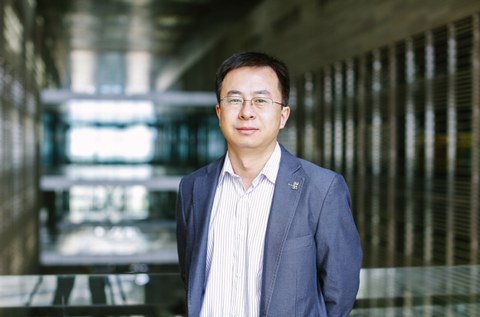Jan 07, 2022
Humboldt Research Fellow Chemist Yu Han from KAUST comes to TU Dresden
Yu Han, Professor of Chemical Sciences and Chemical Engineering at King Abdullah University of Science and Technology (KAUST) in Saudi Arabia, has been awarded the prestigious Humboldt Research Award. Professor Han received the award through the nomination and recommendation of chemist Prof. Stefan Kaskel of Technische Universität Dresden, with whom he will work together this year on high-resolution imaging of flexible metal-organic frameworks (MOFs).
Metal-organic frameworks are compounds consisting of organic and inorganic groups with a large number of pores into which other molecules can be incorporated. For several years already, they have been widely used in gas storage, molecular separation, sensor technology and catalysis. In materials research, great hope rests especially on flexible, switchable MOFs as smart materials for technical applications. They are periodically ordered crystals, but at the same time porous and flexibly deformable.
Prof. Stefan Kaskel and his team at Technische Universität Dresden have already developed several of these materials. Therefore, Stefan Kaskel is considered one of the leading scientists in the field. Just recently, he was ranked by Clarivate Analytics as one of the most highly cited researchers worldwide.
"We are delighted to welcome Prof. Yu Han to Dresden in June 2022. We are proud to initiate a high-profile collaboration in the field of functional porous materials with an outstanding expert in the field of high-resolution electron microscopy of radiation-sensitive materials," explains Kaskel.
Prof. Yu Han is a renowned top researcher being listed among the highly cited researchers worldwide in 2021. In the context of the Humboldt Research Award, Prof. Han will visit TU Dresden twice in 2022, the first time in June for the annual meeting of the Alexander von Humboldt Foundation. While at TU Dresden, Prof. Han will seek to establish extensive collaborations with research groups in Germany that specialize in the fields of nanoporous materials and electron microscopy.
“I am proud to see that the ultra-low-dose electron microscopy technology we developed at KAUST has had an increasing impact internationally. The award is a recognition for my research activities rooted in KAUST, which will encourage our team to be more committed to what we are doing,” says Han.
He and his group are already working with Kaskel's group on a joint project for high-resolution imaging of DUT-8, a well-known flexible MOF material developed at TU Dresden. "We look forward to expanding our collaboration from imaging to applications of reactive porous materials in separation and catalysis," emphasize Han and Kaskel.
Media inquiries:
Stefan Kaskel
Professor of Inorganic Chemistry
TU Dresden

